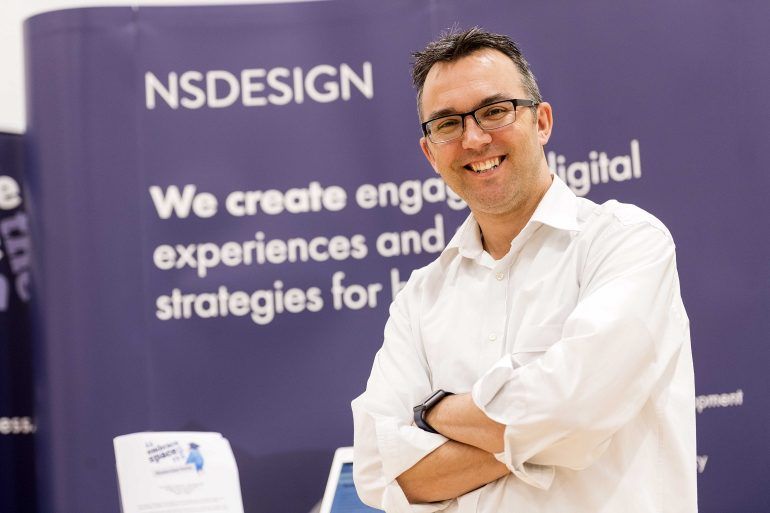He hails from Largs and, whisper it, his son plays football for local rivals Greenock Morton, but Gary Ennis’ business credentials are firmly rooted in Renfrewshire.
Hillington Innovation Park has been home to Gary’s digital training consultancy NSDesign since 2005 and Gary also represents the voice of microbusinesses on Renfrewshire’s Economic Leadership Panel.
Here, he shares his thoughts on the region’s potential.
“My educational background has nothing to do with what I’m doing now.
I actually have an architecture degree from the University of Strathclyde and was about to jump ship and do a business degree when the architecture department set up a research group looking at the internet. I said to myself there’s money to be made in this as it’s about to go boom and I’m in a nice position, learning all this geeky stuff, doing early VR, 3D modelling and building websites.
I started NSDesign in 1999 and back then it was me building websites and hassling family members and friends to pick up work. We developed into a digital agency and now my focus is on the training side, addressing the skills gap in digital, whether that’s me in schools speaking to pupils, doing Business Gateway workshops or one-to-one consultancy with companies.
A mini Scottish economy
Hillington was my preferred destination for the business as it was an innovation centre, where you were vetted to get through the door and nurtured and supported to grow. I used to joke to customers and say we’re one of the companies in Hillington that’s not a tile shop or a bathroom outfitter. In actual fact there’s a lot of great, smaller companies here. It’s a mini Scottish economy all within the boundaries of Hillington. Traditionally it was manufacturing and much like Renfrewshire it’s a place redefining itself.
I’m really proud to have been invited to contribute to the region’s economic leadership panel. Part of me sometimes feels like a bit of a fraud – I’m sitting on the panel with captains of industry and there are some multi-million-pound turnover companies, big hirers, big players and I’m the very definition of a microbusiness with less than 10 employees.
Champion the smaller business
I take it upon myself to champion the smaller business and it’s so important that smaller organisations have just as much say in the shaping of the economy. With 86% of businesses in Renfrewshire classed as microbusinesses, their importance can’t be underplayed.
I often say that if smaller businesses each hire one new member of staff then you would have zero unemployment in Scotland. It’s about realising the potential, the power and the clout of the small business.
Without the smaller business, we won’t achieve the economic growth we want. Regrettably starting up your own company is still sometimes seen as a second-place scenario where redundancy forces people to look at their options, where I believe if we encourage more entrepreneurialism, more innovation and more businesses with creative, novel, niche, bold, strong, passionate ideas then it lends itself to a more diverse economy, one which is arguably stronger and more resilient.
Creativity evolves
In Renfrewshire, we are a very industrial lot and also very creative, right back to the mills, and that shouldn’t be lost. Creativity evolves so it’s great to see initiatives such as InCube, where artists and designers are making things and getting support to help them to sell right on the high street.
Today’s consumer base, we live online so making something to sell is just the first step; being able to market it and get the awareness through e-commerce and digital marketing, the demand for these skills is huge.
My goal is to upskill people who need to get these digital capabilities in place. There’s nothing better than helping a business and seeing that lightbulb moment as they realise the potential digital can give their business.
I commend the powers that be that the region’s economic strategy is not just led by public sector and kudos to the council for bringing in industry, small business, bigger business, people like the chamber of commerce and speaking to specific sectors as it’s the ongoing discussion that allows you to steer where it goes, every day let alone every month or every year.
Beta software
The world is constantly changing – and digital is a perfect example of this – so you need a strategy that isn’t set in stone, but something adaptable which, if it’s not working you tweak it, you change it.
In the geeky digital world, we call this beta software. Some say that’s just an excuse for when something is never finished, but do you know what, everything in life is beta software and our strategy should be too.

